|
|
|
Sort Order |
|
|
|
Items / Page
|
|
|
|
|
|
|
| Srl | Item |
| 1 |
ID:
058684


|
|
|
| 2 |
ID:
065642
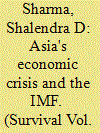

|
|
|
|
|
| Publication |
1998.
|
| Description |
p.27-52
|
|
|
|
|
|
|
|
|
|
|
|
|
|
|
|
| 3 |
ID:
085542
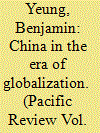

|
|
|
|
|
| Summary/Abstract |
This article looks at the Chinese debate on economic security during the period between 1997 and 2004. The contemporary concept of economic security (jingji anquan), was first raised in the Chinese academic literature in 1997, partly as a reaction to the Asian financial crisis and partly due to the increasing role China began to play in globalization, the effects of which it increasingly felt as its economy became more integrated with that of the world. This article examines the emergence of the discourse on economic security within Chinese academic circles, and identifies the development of this concept in China between 1997 and 2004 prior to the ascendancy of the 'fourth-generation' leadership.
|
|
|
|
|
|
|
|
|
|
|
|
|
|
|
|
| 4 |
ID:
093845


|
|
|
|
|
| Publication |
2010.
|
| Summary/Abstract |
This paper examines the integration and causality of interdependencies among seven major East Asian stock exchanges before, during, and after the 1997-1998 Asian financial crisis. For this purpose, we use daily stock market data from July 1, 1992 to June 30, 2003 in local currency as well as US dollar terms. The data reveal that the relationships among East Asian stock markets are time varying. While stock market interactions are limited before the Asian financial crisis, we find that Hong Kong and Singapore respond significantly to shocks in most other East Asian markets, including Shanghai and Shenzhen, during this crisis. After the crisis, shocks in Hong Kong and Singapore largely affect other East Asian stock markets, except for those in Mainland China. Finally, considering the role of the USA shows that it strongly influences stock returns in East Asia - except for Mainland China - in all periods, while the reverse does not hold true.
|
|
|
|
|
|
|
|
|
|
|
|
|
|
|
|
| 5 |
ID:
053715


|
|
|
|
|
| Publication |
Aug 2004.
|
| Description |
Aug 2004
|
|
|
|
|
|
|
|
|
|
|
|
|
|
|
|
| 6 |
ID:
089223
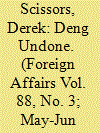

|
|
|
|
|
| Publication |
2009.
|
| Summary/Abstract |
The year 2008 marked the 30th anniversary of the beginning of market reforms in China -- and perhaps the third anniversary of their ending. Since the present Chinese leadership took power, market-oriented liberalization has been minor. And as such policies have wound down, they have been supplanted by renewed state intervention: price controls, the reversal of privatization, the rollback of measures encouraging competition, and new barriers to investment.
|
|
|
|
|
|
|
|
|
|
|
|
|
|
|
|
| 7 |
ID:
191945
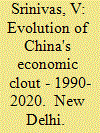

|
|
|
|
|
| Publication |
New Delhi, ICWA, 2020.
|
| Description |
48p.pbk
|
| Series |
Sapru House Paper
|
| Standard Number |
9789383445455
|
|
|
|
|
|
|
|
|
|
|
|
Copies: C:1/I:0,R:0,Q:0
Circulation
| Accession# | Call# | Current Location | Status | Policy | Location |
| 060435 | 330.951/SRI 060435 | Main | On Shelf | General | |
|
|
|
|
| 8 |
ID:
086586


|
|
|
|
|
| Publication |
2009.
|
| Summary/Abstract |
This paper examines the welfare implications of adjustments in public-sector wages and capital tax rates for a small open economy in a general equilibrium setting. The individually and jointly optimal wage and tax policies are derived and interpreted. Facing reductions in land sales and falls in foreign interest rates, a cut in public workers' pay is needed to make their wage comparable to the private sector and a hike in capital taxes is recommended for a budgetary consideration. Using a computable general equilibrium model for Hong Kong, we numerically evaluate the various optimal policies which not only confirm the theoretical results but also provide quantitative estimates of the optimal policy variables.
|
|
|
|
|
|
|
|
|
|
|
|
|
|
|
|
| 9 |
ID:
155095
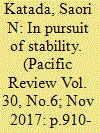

|
|
|
|
|
| Summary/Abstract |
Over the last 30 years, East Asia has progressed from virtually no intergovernmental arrangement in the 1980s to exclusive financial regionalism supported by strong centripetal forces in the aftermath of the Asian Financial Crisis (1997–1998), but this move has not yet produced coherent regional financial architecture. This article examines the evolution of Asia's regional financial architecture of the last three decades and discusses factors that have promoted and inhibited Asia's efforts toward financial regionalism. Since the Global Financial Crisis (2008–2009), the centripetal forces that aided the region's defensive regionalism have weakened, and the crisis has moved the region to seek multiple sources of financial stability from global to regional. On the one hand, given its export-promotion strategy, East Asia still relies heavily on the global financial architecture, and the region's US dollar dependence continues. On the other hand, the Global Financial Crisis has triggered China to seek reform in global financial order and some alternative solutions. For the latter, its monetary authority actively engages in internationalization of its currency, Renminbi, and promotion of the Asian Infrastructure Investment Bank. In this environment, coherent financial regionalism for East Asia is yet to emerge, as East Asian governments continue to search for monetary and financial stability.
|
|
|
|
|
|
|
|
|
|
|
|
|
|
|
|
| 10 |
ID:
107601
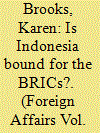

|
|
|
|
|
| Publication |
2011.
|
| Summary/Abstract |
As Indonesia hosts a number of high-level summits this year, it looks set to take its place among the world's economic superstars. But celebrations are premature: although the country has made great strides, its gains are reversible. For the country to continue to prosper, Jakarta must address rampant corruption and poor governance.
|
|
|
|
|
|
|
|
|
|
|
|
|
|
|
|
| 11 |
ID:
103038
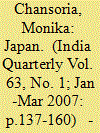

|
|
|
| 12 |
ID:
137351


|
|
|
|
|
| Summary/Abstract |
Keynote Speech at the Luncheon of the Third World Peace Forum
Executive Vice Foreign Minister Zhang Yesui
Tsinghua University, 21 June 2014
It is a privilege to speak at the luncheon of the Third World Peace Forum.
As I've noticed, China's foreign policy has drawn much attention from the international community as the country continues to grow. Therefore, I wish to take this opportunity to share with you my thoughts on the following questions.
|
|
|
|
|
|
|
|
|
|
|
|
|
|
|
|
| 13 |
ID:
055429


|
|
|
| 14 |
ID:
102994
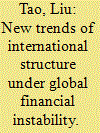

|
|
|
| 15 |
ID:
130049
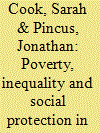

|
|
|
|
|
| Publication |
2014.
|
| Summary/Abstract |
Social protection programmes have expanded rapidly in the developing world in recent years. In Southeast Asia, the experience of the Asian Financial Crisis of the 1990s heightened awareness of vulnerability to poverty and the role of government in protecting households from a sudden loss of employment and income, or from contingencies such as ill-health and ageing. Most governments have expanded targeted social assistance programmes, although the quality and coverage of these programmes vary from place to place. Public support for basic health and education services is also uneven. Common challenges in the region include economic risks associated with financial globalization, rapid urbanization, high levels of informal employment, rising dependency ratios and a highly unequal gender division of labour.
|
|
|
|
|
|
|
|
|
|
|
|
|
|
|
|
| 16 |
ID:
111032
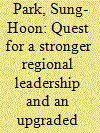

|
|
|
|
|
| Publication |
2012.
|
| Summary/Abstract |
The Korean economy has suffered two major economic crises over the past 15 years - the 1997 Asian financial crisis and the 2008 global financial crisis. After analyzing both the changes in policy environments and Korea's policy responses, the article argues that the ongoing global financial crisis provided a welcomed opportunity for Korea to increase its regional and global influence. Korea's regional leadership has been strengthened especially in promoting the "development" issue in a number of international forums and in establishing a more effective crisis-prevention framework in the Asian region. As the host country of the 5th G20 Summit Meeting in 2010, Korea initiated a number of global issues, such as "development", "global financial safety net", "green growth strategy", and has been successful in fortifying its position in the global arena. As a result, the global profile of Korea appears to have been raised both substantially and substantively.
|
|
|
|
|
|
|
|
|
|
|
|
|
|
|
|
| 17 |
ID:
088389


|
|
|
|
|
| Publication |
2009.
|
| Summary/Abstract |
This paper explores the sequence, pace, and emerging outcomes of bank restructuring in South Korea since the financial crisis in late 1997, paying special attention to the state intervention pattern in regard to resolving non-performing loans and privatizing temporarily nationalized banks by foreign selling.
|
|
|
|
|
|
|
|
|
|
|
|
|
|
|
|
| 18 |
ID:
098772


|
|
|
| 19 |
ID:
166120


|
|
|
|
|
| Summary/Abstract |
This paper aims to examine whether the industrial development of South Korea has been transformed from the state-led developmental model towards the new balanced model as anticipated by the government after the 1997 Asian financial crisis. The new role of the state would surely transform under the new development model. However, the academic debate on what has been changed and its effectiveness remains. Our main research question is: in the pursuit of social equity and balanced development, has the role of the Korean state as well as institutional arrangements shifted? What factors influence the outcomes and obstacles? In summary, the South Korea state altered its role to decentralize resources to various private actors and delegate regional government and local agents, such as technology parks, research institutions, and universities. This initiative aims to promote endogenous growth through a bottom- up approach. Particularly, the approach for financial funding and technology transfer were derived from the United States neo-liberal method, namely, Silicon Valley model. However, the outcomes deviated from those expected. We conclude that path-dependent factors, such as chaebol-monopolized industrial structure and political cronyism issues, hinder the intent of such transformation.
|
|
|
|
|
|
|
|
|
|
|
|
|
|
|
|
| 20 |
ID:
174444


|
|
|
|
|
|
|
|